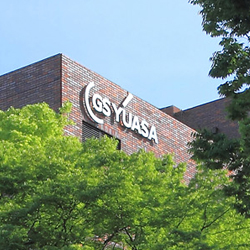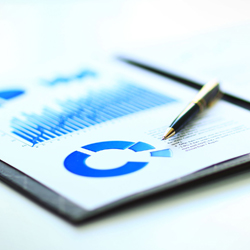Fulfillment of Our Responsibilities to Provide Safe and Secure Products and Services
We seek to understand the true needs of customers through communication with customers
and to provide safe and reliable products and services so that we can grow along with customers.
Quality Management
Ensuring Quality and Safety through Company-wide Quality Management
The GS Yuasa Group is promoting initiatives aiming to improve the quality of the products and services offered to our customers on a group-wide basis, based on the Quality Policy. To remain a manufacturer trusted by customers at all times, the GS Yuasa Group approaches manufacturing activities from the customer's perspective and works relentlessly to improve the quality of products and services.
To maintain this trust, we formulated, under the leadership of top management, the GS Yuasa Quality Management System based on the ISO 9001 standard and are promoting a quality management system that crosses business divisions. The quality of our products and services is discussed company-wide every month by the Quality Management Committee, which is chaired by the executive officer in charge of quality, to enable us to enhance quality by responding swiftly to any change.
As part of our initiatives to pursue manufacturing, we provide quality-related education courses to all employees and promote improvement team activities company-wide as a way to bolster the awareness of quality among employees and to boost their understanding and skills related to quality management. Thereby enhancing the quality of our products and services.
These activities have been highly rated by the Union of Japanese Scientists and Engineers, and the Industrial Batteries Production Division of the Industrial Batteries & Power Sources Business Unit received the Deming Prize, which is designed to reward individuals and companies who have produced good results through the implementation of quality management, in fiscal 2015.
Quality Policy
GS YUASA is committed to a diligent study of 'Monozukuri' customer first thinking and the improvement of products and service for the realization of our Corporate Philosophy.
'Monozukuri':
Meaning 'Meaning 'manufacturing' is not just pointing to 'craftsmanship' in the narrow sense. It is "the overall process of the corporation, the industry and the on-site activity, implementing the designers' determination into the products and the services for customer satisfaction, corporate profit and job security."
Quality Management Organization
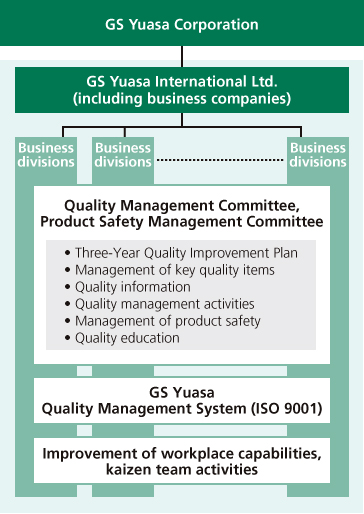
Quality Loss Index for Domestic Business
Please scroll sideways
| Items | FY 2020 | FY 2021 | FY 2022 | FY 2023 | FY 2024 | Remarks |
|---|---|---|---|---|---|---|
| Quality loss index | 129 | 125 | 117 | 159 | 103 | Loss ratio occurring during product manufacturing and sales |
The fiscal 2019 quality loss index is set at 100, indicating the changes in the quality loss rate over five years.
Status of acquisition of certification of standards for quality management system (domestic business sites)
Please scroll sideways
| Business Unit | Scope of application | Certification number (ISO 9001、IATF16949*) |
|---|---|---|
| Automotive Batteries | GS Yuasa International Ltd. Automotive Battery Business Unit | JQA-1678, JQA-AU0447-1~4 |
| GS Yuasa Energy Co., Ltd. | YKA-4005088 | |
| Blue Energy Co., Ltd. | JQA-QMA14793 | |
| GS Yuasa International Ltd. Lithium-ion Battery Business Unit | 50301451 QM15、50311451 IATF16 | |
| Industrial Batteries, Power Supplies | GS Yuasa International Ltd. | JQA-1397 |
| Yuasa Membrane Systems Co., Ltd. | JQA-QMA15374 |
IATF16949: International standard for quality management systems in the automotive indsutry
Rounds of inspection by top management
The GS Yuasa Group systematically conducts rounds of onsite inspection, centering on domestic factories and branches, by management. Through rounds of inspection by management conducted as part of top management activities, the management grasps the actual state of onsite operations and has a dialogue with employees working at each site.
Based on the "quality" of work, employees share the situation of actual activities and tasks regarding various themes such as safety, quality and environment with management, fostering mutual understanding.
Persons in charge of onsite operations as well as younger managers report tasks and activities of each site to management, providing an opportunity for the exchange of opinions between employees and management.
Promoting Greater Customer Satisfaction
The GS Yuasa Group values the opinions, recommendations and complaints of customers regarding our products and services as important customer feedback. We improve our products and services after considering inquires received by email and the opinions of customers heard at our Consultation Service Counter. We have taken measures using audio guidance through which the telephone number of a person in charge is automatically dialed according to inquiries from customers from fiscal 2017, making efforts to improve convenience for customers.
The number of complaints received from customers increased by five from fiscal 2023, but this does not represent a significant increase in comparison to levels in previous years.
Going forward, we will continue working to improve customer satisfaction by paying close attention to the opinions of our customers.
Inquiries and customer complaints
Please scroll sideways
| Items | FY 2020 | FY 2021 | FY 2022 | FY 2023 | FY 2024 |
|---|---|---|---|---|---|
| Number of inquiries | 11,766 | 12,672 | 11,374 | 11,300 | 11,709 |
| Number of complaints | 15 | 21 | 10 | 2 | 7 |
GS Yuasa Consultation Service Counter
(accepts inquires and provides consultation on the GS Yuasa Group's products)
Toll free (in Japan):0120-43-1211 Hours: Weekdays 9:00 - 17:30
(excluding Saturdays, Sundays, public holidays and holidays prescribed by the Company); Valid only within Japan,
Improving Employees' Awareness of Quality
We continuously operate a system under which all directors and employees can be taught based on the type of their work and their experience through a quality education program systemized according to the level of quality control and type and rank of their job. Furthermore, basic quality-related education has been compulsory for all new recruits since fiscal 2008 and their knowledge of quality control (QC) is evaluated based on the results of the QC examination. Since fiscal 2023, some courses have been delivered in video format, enabling employees to learn at their own pace.
The Group is committed to working on quality-related education targeting employees to improve product quality and ensure the safety of its products.
Please scroll sideways
Quality-related Education
| Quality Management Knowledge Level | Quality Education Course | External Seminars, etc. | Target Ranks and Job Types | Reference Level for QC Examination |
|---|---|---|---|---|
| Quality Management | - | ●Quality Control Symposium, ●Quality Management Seminar for Officers | Officers, General Managers | - |
| Quality Control Application | ●Specialist Training Course for Manufacturing (Learning practical knowledge to develop management skills), ●Experimental design method, ●Reliability and quality engineering | - | Key personnel in the Technical Development Department and Quality Control Department | Level 1 |
| ●Internal Quality Auditor Training, ●DRBFM, ●FMEA, ●Product Safety (Methods), ●Product Safety (Outline), ●Quality Management System Requirements, ●Estimation and Testing of statistical hypothesis, ●Methods of statistical analysis | Quality Management Correspondence Education (Preparation course for QC Examination Level 2) | Technological development section, Quality management section | Level 2 | |
| Basic Knowledge of Quality Control and TQM | ●Seven New OC tools, ●Statistical data necessary for process control, ●Methods of collecting and summarizing statistical data, ●Support for Taking QC Examination Level 3, ●"why-why analysis", ●Course for improving team leadership, ●Daily management, ●TQM (Outline) | Quality Management Correspondence Education (Equivalent to QC Examination Level 3) | All employees who entered the company 2 or more years ago | Level 3 |
| Introduction to Quality Control | ●QC Story Method, Seven QC tools、●Basic Quality (general) | Quality Management Correspondence Education (Equivalent to QC Examination Level 4) | New employees | Level 4 |
Note: QC Exam levels are for reference only.
Implementation Status of Quality-related Education (Fiscal 2024)
| Level of quality management knowledge | Number of courses | Number of participants |
|---|---|---|
| Applied | 18 | 481 |
| Basic and TQM | 9 | 275 |
| Introductory | 2 | 398 |
| Total | 29 | 1,154 |
Cumulative Total of Successful QC Examinees
Please scroll sideways
| Level | FY 2020 | FY 2021 | FY 2022 | FY 2023 | FY 2024 |
|---|---|---|---|---|---|
| Grade 1 | 13 | 14 | 14 | 15 | 16 |
| Grade 2 | 275 | 307 | 330 | 352 | 373 |
| Grade 3 | 900 | 1,006 | 1,109 | 1,307 | 1,474 |
| Grade 4 | 1,826 | 1,943 | 2,093 | 2,244 | 2,403 |
| Total | 3,014 | 3,270 | 3,546 | 3,918 | 4,266 |
Developing Human Resources in Quality Management through "Monozukuri (Manufacturing) Expert" Education
On the occasion of the 100th anniversary of its founding, the GS Yuasa Group launched the "Monozukuri Expert" education workshops in October 2017, with the aim of developing continuously human resources who can "study Monozukuri diligently" under the Group's Quality Policy.
At the workshops, we are aiming to develop human resources who will learn control technology required mainly for design development and be capable of implementing such technology. Participants of the workshops are expected to become an expert after a one-year training period and act as a core member for quality improvement in the workplace by utilizing his/her knowledge and experience.
Product Safety
Initiatives for Product Safety
Ensuring product safety of GS Yuasa Group's products has been positioned as a critical challenge because our products store, control and convert electrical energy.
The Group has established a company-wide organization with the Product Safety Management Committee as the center, to promote product safety management based on international standards for quality management systems. In addition to conforming to product safety standards, each business division utilizes the results of product safety risk assessments as well as know-how gained from case studies of failures to develop products that factor in the product usage environment and safety as the products are used, age, and deteriorate. Further, in addition to making note of product unsafe events on a daily basis, we provide our customers with appropriate product safety information. In the unlikely event of the occurrence of a product accident that may harm our customers, we implement a system in which we immediately confirm the facts and investigate the cause, and respond to emergencies (providing prompt and appropriate information, first aid measures to prevent the occurrence and spread of harm, measures to prevent recurrence, and so on), as necessary. Also, for the continued enhancement of product safety management, we leverage information such as points for improving product safety obtained through periodic internal audits and external inspection.
Please scroll sideways
GS Yuasa Product Safety Action Flow
| No. | Flow | Details of activities | Process, mechanism |
|---|---|---|---|
| 1 | Promotion of product safety management (Product Safety Management Committee) |
|
|
| 2 | Product safety activities |
|
|
| 3 | Gather information on products and services |
|
|
| 4 | Examine information and take appropriate steps |
|
|
Status of achievement of product safety targets (Fiscal 2024)
| Items | Target | Result | Scope of application | Remarks |
|---|---|---|---|---|
| Number of serious product accidents | 0 | 0 | Group-wide | Applicable to product accidents involving death, serious injury or illness, permanent disability, fire, etc. |
Examples of Activities
Presentation about Team Activities to Drive Kaizen (improvement)
The GS Yuasa Group is promoting kaizen team activities to bolster the awareness of quality among employees and conduct aggressive quality management control in an effort to improve the quality of our products and services. In addition, we have held a presentation event at which kaizen teams present examples of their improvement activities since fiscal 2004, for the following purposes:
- Promotion of activities to enhance workplace capabilities
- Learning from kaizen activities/successful results and horizontal deployment
- Participation of all employees in kaizen activities
- Promotion of dynamic communications
- Building a corporate culture with a mindset focused on improvement
Every year, a large number of employees, including employees of overseas Group companies, participate at the presentation event, and kaizen teams nominated by each business division present examples of their various improvement measures. This presentation event was held twice in fiscal 2024, and executives and involved employees participated at the venue, while audience members participated online. Following the presentations, our president gave feedback to each presenting team, and the chairman expressed his appreciation to the teams and provided an overall evaluation of the event. Three presenting teams, selected by the votes of Company officers, were presented gold, silver, and bronze awards. At presentation events in recent years, not only kaizen teams in quality-related business divisions but also people in the sales and development divisions, management divisions, and internal divisions made presentations, with a variety of themes.
The GS Yuasa Group believes that everyone must attain quality management tools. Through the presentation event, we will share experiences/know-how in each workplace on a global basis and horizontally develop the results of improvement, continuing our efforts to conduct various improvement activities.
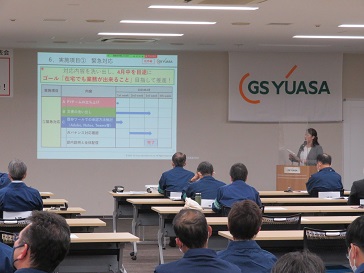
During the presentation
Holding an exhibition showing examples of critical quality problems
The GS Yuasa Group believes that failure at a workplace provides a valuable learning opportunity in terms of the prevention of defective products.
From this perspective, we have taken measures from fiscal 2016; specifically, we share information on examples of past product-related accidents caused by unsafe conditions and critical quality problems with employees so that we will never allow a similar quality problem to occur.
In fiscal 2024, the critical quality problem example exhibition was held at the Kyoto Plant, one of our Group companies, and about 300 employees participated in this exhibition.
These exhibitions use panels and other means to explain the causes, mechanisms and other aspects behind the occurrence of past critical quality problems, helping employees recognize examples of past mistakes as important lessons. For further understanding of such lessons, areas are provided for exhibition-related presentations and Q&A sessions. Until fiscal 2018, exhibitions of critical quality problems were held for limited periods, but in an effort to increase employee participation, a permanent exhibit was created in January 2020. In addition, since December 2024, an online exhibit that highlights some of the critical quality problems has enabled information on these problems to be shared with employees at sites other than the Kyoto Plant at any time. Results of participant questionnaires indicate that these exhibitions are effective in raising employee awareness of quality issues. Reflecting such visitor desires, exhibitions will continue to utilize the lessons of past failures to raise quality going forward.
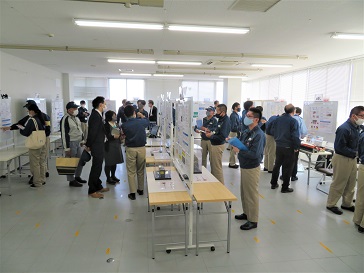
At the critical quality problem example exhibition
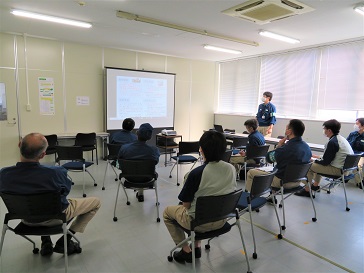
At the presentation

